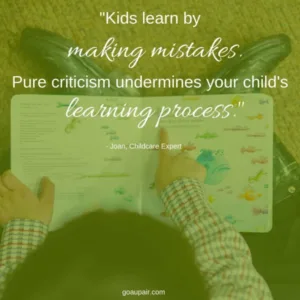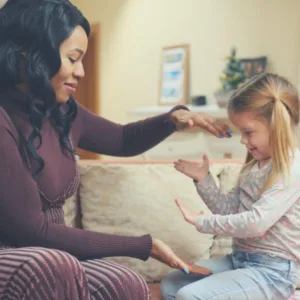Is criticism good or bad? Many of us associate criticism with disapproval or harsh judgment. However, whether criticism has a positive or negative impact depends entirely on how it’s delivered.
Constructive criticism for kids is about offering feedback with care and love—think of it as compassionate critique. Kids, like adults, learn by making mistakes. While harsh criticism can hurt a child’s development, compassionate critique encourages growth, resilience, and confidence.
So, how can you offer feedback that corrects mistakes without tearing your child down? This is where constructive criticism becomes essential. By focusing on improvement rather than judgment, children can learn to handle feedback, accept it as part of their learning process, and grow from it.
And guess who can play a big role in teaching this? An Au Pair! Au Pairs, who are deeply integrated into your family, act as excellent role models. They receive constructive feedback from Host Families and help kids learn how to accept feedback with grace, contributing to both their personal growth and that of the children they care for.

What is Constructive Criticism?
Before you can give constructive criticism, you need a firm understanding of what it is. Constructive means to build up or serve a useful purpose, while criticism is a review or assessment. Put together, constructive criticism is a useful review or assessment that promotes growth.
It’s easy for most of us to understand this in the context of school or work. We all have examples of professors or bosses giving us feedback that helped us develop — and examples where all it did was tear us down. But applying this to our home life can be intimidating.
Approaching Constructive Criticism
Start by asking yourself: What is the goal of constructive criticism? You most likely want your child to make positive changes by focusing on their ability to grow and improve rather than feeling bad or dwelling on negative feedback. When they know their abilities can improve with effort and learning, children embrace challenges and persist despite setbacks.
When providing constructive criticism to children, focus on their behavior, not their personality. Address the action that needs improvement so the child understands what needs to change without it feeling like a personal attack.
For instance, instead of saying, “You’re messy,” you could say, “Leaving your toys out makes it hard to walk around.” This way, the child can see the direct impact of their actions and is more likely to respond positively and accept feedback.
Being specific in your feedback is also crucial. Providing clear, concrete examples of what needs improvement prevents confusion, allowing the child to know exactly what to work on.
Empathy and kindness are central to the feedback process. Speak with compassion and acknowledge their feelings. Reassure them it’s okay to make mistakes. Learning from errors builds resilience, self-esteem, and a growth mindset. By approaching the situation with understanding, you create a supportive environment where the child feels safe to grow and improve.

Pro Tip: An Au Pair can make the perfect role model for teaching this important life skill to their Host Children. Au Pairs support Host Parents in all ways involving their kids, yet need to be willing to accept some constructive criticism in order to meet the needs of their hosts and contribute to successful experiences.
Constructive Criticism or Bullying: Know the Difference
Not all criticism is constructive. In fact, sometimes criticism can cross the line into bullying. While bullying aims to harm or belittle, constructive criticism empowers—it seeks to correct behavior in a way that encourages positive change.
However, even well-meaning feedback can be misinterpreted by children. That’s why it’s important to help kids recognize the difference between helpful feedback and harmful comments. Regular communication is key to helping your child understand this distinction.
Pro Tip: Au Pairs, who build close bonds with host kids, often provide emotional support that helps children differentiate between constructive criticism and bullying. Their unique role in the family allows them to offer valuable feedback with kindness and compassion. Overall, the best constructive criticism for kids is uplifting, kind, and informative.

5 Benefits of Constructive Criticism for Kids
Constructive criticism offers many benefits that contribute to a child’s overall development. Specific and helpful feedback allows children to grow, learn, and improve. So, why is constructive criticism important? Here are five benefits to your children.
1. Developing Self-Awareness and Self-Improvement
Constructive criticism helps children reflect on their actions and behaviors. By recognizing their strengths and areas for improvement, they become more self-aware and able to embrace learning opportunities.
2. Improving Problem-Solving Skills
When children receive gentle feedback, they learn to think critically and develop problem-solving abilities. Constructive feedback lets them explore solutions and strategies, promoting independent thinking and resilience in facing challenges.
3. Promoting Healthy Communication
Learning to give and receive constructive criticism develops a child’s communication skills. They become better at articulating thoughts, listening actively, and engaging in positive interactions. This foundation leads to stronger relationships and effective collaboration in group settings.
4. Building Emotional Intelligence
Constructive criticism helps children recognize and manage their emotions, especially when responding to feedback. Developing emotional intelligence enables them to regulate their feelings, empathize with others, and navigate social situations with confidence and sensitivity.
5. Encouraging Responsibility and Accountability
When children realize they are accountable for their mistakes, they’re more likely to take responsibility for their actions. Constructive criticism reinforces that errors are opportunities for growth rather than failure, promoting accountability and maturity.

Tips for Helping Kids Deal with Constructive Criticism
Accepting and acting on constructive criticism is an essential life skill for children, helping them grow, improve, and develop resilience. Here are some actionable tips to assist kids in dealing with criticism effectively.
Model Healthy Criticism
Show how to give and receive positive feedback in your own relationships. Children learn by observing adults, so show them what an example of constructive criticism is by providing clear examples, and they will internalize it.
Focus on Behavior, Not Personality
If you want the child to accept criticism, concentrate on specific actions rather than criticizing their character. For instance, instead of saying, “You’re careless,” say, “I noticed you forgot to put your toys away after playing.”
Be Specific and Objective
Provide clear examples and focus on observable behaviors. Vague statements can be confusing. Instead of saying, “You’re not paying attention,” specify, “I noticed you missed a couple of steps while setting the table. Let’s go over them together so it’s done correctly next time.”
Encourage Self-Reflection
Help your child reflect on their actions by asking open-ended questions like, “What do you think went well, and what could be better next time?” This promotes self-awareness and self-improvement.
Teach Emotional Regulation
Assist kids in managing their emotions when receiving criticism. Techniques such as taking deep breaths, counting to 10, or stepping away briefly can help them process feedback without becoming overwhelmed.
Practice Active Listening
Encourage your child to listen carefully to feedback, ask questions for clarification, and paraphrase what they’ve heard to ensure understanding. This creates effective communication skills and illustrates how to constructively criticize oneself and others.
Focus on Solutions
Work together to find ways to improve rather than just pointing out mistakes. For example, if they struggled with a math problem, suggest practicing similar problems together to build confidence.
Praise Effort, Not Just Results
Celebrate your child’s effort and persistence with positive comments, even if the outcome isn’t perfect. This will create a desire for self-excellence and emphasize the value of hard work.
Role-Play Different Scenarios
Practice handling criticism through role-playing. Simulate situations where they might receive feedback, such as from a teacher or friend, to build confidence and coping strategies. This hands-on experience demonstrates constructive criticism examples in a safe environment.
When Should Constructive Criticism Start?
Teaching kids how to take criticism from an early age is a good idea. People will be giving criticism (constructive and not) their entire lives.
Receiving feedback is difficult, even as an adult. None of us likes to hear what we are doing wrong, but we can benefit from knowing how we can be more successful. Think of it as a mindset.
So, is constructive criticism good for children of all ages? Infants under a year cannot understand criticism. They do understand intonation and volume of voices. At this stage, parents are often focused on teaching babies that hitting, pulling hair, and biting are not okay.
Toddlers understand when a parent or caregiver corrects their behavior. School-aged children are used to constructive feedback from teachers but may need guidance to handle feedback from parents or caregivers.
Older kids can be taught ways to manage feedback from a variety of sources. Teens and young adults are still learning to handle and apply constructive criticism to life.

Who Should Give Constructive Criticism to Kids?
Parents and caregivers are the first to provide constructive criticism to kids. Later, teachers and coaches will join the crowd. Criticism is easier to handle when it comes from someone who cares for the child. Kind words ensure the child knows the critique comes from a place of love.
Starting early can help children learn to cope with feedback in a healthy way. Try not to criticize children in a way that makes them feel bad. Help little ones understand that when given in a caring way, constructive criticism is just a way for things to be better. As children grow, families and Au Pairs can show kids how constructive criticism can help them improve their performance in all sorts of activities.
Sports coaches are well-practiced with constructive criticism for kids. A coach’s goal is to teach the skills and rules of a sport. These skills help children learn to follow rules and adopt new skills daily.
Teachers, professors, and bosses will also provide constructive criticism for decades to come.
Teaching kids early in life to cope with constructive criticism is definitely worth the effort!
Constructive Criticism in Action
We’ve given you a lot of information, and you might struggle to take it from the screen to real life. To help, here are some basic examples of constructive criticism for kids, segmented by age group.
Critiquing Toddlers in an Empowering Way
- During dressing tasks, have your child check themselves in the mirror to see if clothing is on correctly, shoes on the right feet, and so on, asking, “Does that look (or feel) right?”
- Have your child check the weather for clothing that might be required, like a raincoat, winter gear, etc., before leaving for daycare or an activity, rather than criticizing them for getting their shoes wet.
- During cleaning tasks or chore time, a toddler can be shown they left a pile of dirt and help to sweep it in the trash.
- During meals, kids will be messy and make spills. They can help wipe up messes they make. Help kids recognize a mess and then provide simple materials for basic cleanup.
- Show toddlers how holding a cup or spoon correctly can lessen spills, and be prepared to show them again, and again.
- During playtime, allow toddlers to play with toys or games however they want unless they are misusing them or in ways that cause harm. Avoid saying, “You’re doing that wrong. ” Instead, an adult could offer, “Try moving it like this,” or “Try it again.”
- Young children might cry when they lose a game. Help create the mindset that games are fun to participate in, and there are usually more chances to play again, even if they don’t ever win.
Uplifting Comments for School-Age Children
- During chore and homework time, instead of criticizing, help kids to evaluate whether the chore or assignment is well done (would they consider the chore well done if their brother or sister did it that way? Will parents or teachers say the assignment is well done?).
- Along the same lines, kids can learn that looking at a teacher’s notes on a project can be applied to future projects to earn better grades.
- During playtime, encourage learning new games and their rules. Avoid negative comments, even if the child is doing it wrong. Say things like, “I think you will be more successful doing it like this,” or “It helps me to…” or “Can you read that rule again?”
- If kids are sore losers after a game, explain that everyone wants to win, but that cannot be the case. Help kids to recognize what they could have done to win, if anything. Then, help them move on to another chance at it, a different game, or some practice drills to improve a skill.
- School-aged kids sometimes experience friend problems and may need help to put themselves in someone else’s shoes. Au Pairs can talk to kids about their experiences meeting new friends in a new place.
Constructive Feedback for Tweens & Teens
- Teach tweens and teens to evaluate chores and homework tasks, with even more conversation about doing things right the first time and natural consequences. If they do not keep up with laundry (even if that just means getting it to the basket for the Au Pair to wash), the outfit they want for Friday might not be clean. If all assignments are not completed and submitted, they will miss a special event at school.
- Time management becomes important for kids at this age, so rather than hurrying your teen, timers can help keep pace, whether completing an assignment or free time.
- Grades and sports become connected in middle school. Kids who struggle with academics need constructive criticism. Show them how taking notes during class or seeing the teacher for extra help can improve their chances of success.
- Hygiene can be an area where kids get criticism from their peers. So, help kids evaluate whether they are ready or not. Honesty is the best policy when it comes to constructive criticism about teens’ hygiene. Hearing about body odor or bad breath from your buddies is much more embarrassing. Most kids would rather hear it from a parent or Au Pair! Be sure to provide travel-size products for backpacks or sports bags.
Celebrate Acceptance of Constructive Criticism
- Even the youngest kids learn from the criticism they receive.
- Next time your little one cleans her own mess, cheer!
- If you correct behavior and there are no tears, give a high five!
- When you see your little one checking the weather before getting dressed, recognize him!
- If your tween notices an error on their homework and fixes it, notice her!
- When you see your teen checking the mirror before leaving the house, be glad they care how they look!
Parents want kids (and Au Pairs) to take constructive criticism and learn how to grow from it. That’s not to say anyone wants their children to become complacent and submissive, accepting everyone’s criticism without question.
Life is full of people ready to evaluate and criticize. Kids need to recognize the difference between bullying and constructive criticism for kids.
Pro Tip: Ideally, Au Pairs can help teach their Host Kids the concept of continual self-improvement. They have a great opportunity to show them how every “criticism” is an opportunity to grow as a person.
Bonus: Au Pairs Can Help Kids Benefit from Constructive Feedback!
Who loves kids more than their parents and the people who care for them when mom and dad are working? Hosting an Au Pair benefits parents and solves parenting problems beyond just childcare!
Personal growth is a goal for both Au Pairs and Host Kids. Au Pairs are another trusted person and role model to guide your child to their best self!
Why Constructive Criticism and Au Pairs Make a Great Team
Teaching kids how to handle constructive criticism is one of the most important life skills they can learn. By involving an Au Pair in your family’s routine, you give your child a unique opportunity to learn from someone who is both a caregiver and a cultural mentor. Au Pairs model how to accept feedback with grace, which helps kids build confidence, responsibility, and emotional resilience.



